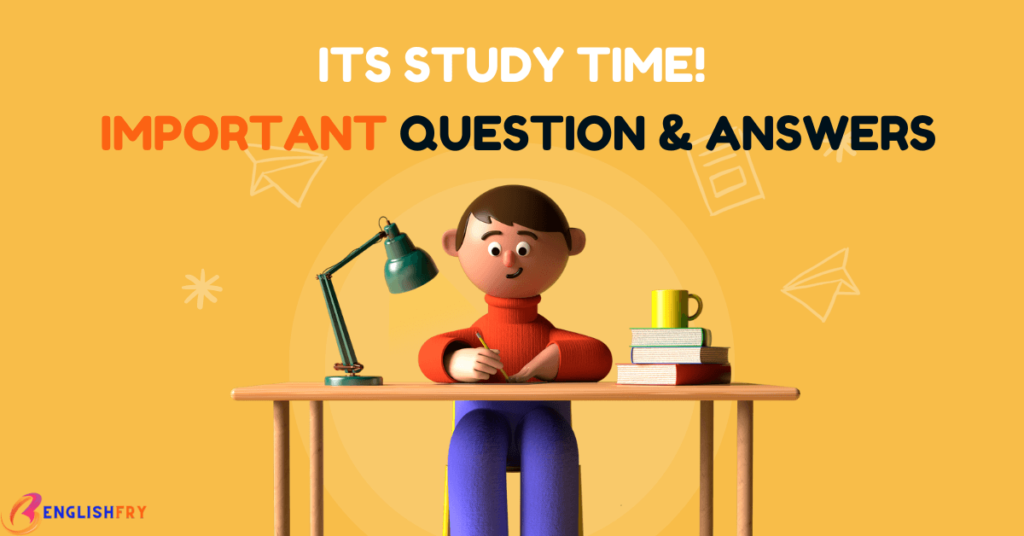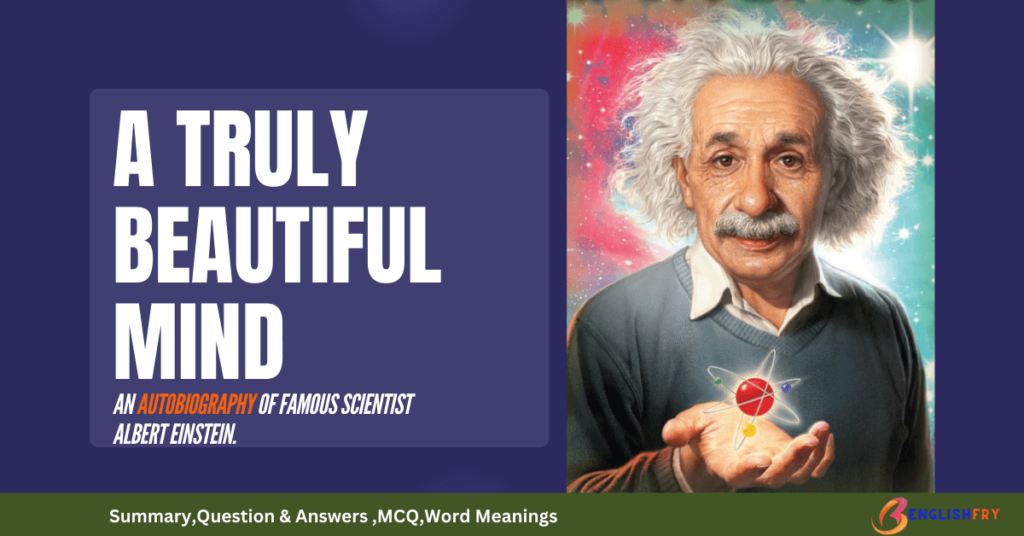We are providing you with a short and detailed summary of the class 9th Beehive Chapter 4 A Truly Beautiful Mind along with the ncert solutions. Students would get a clear idea on how to attempt questions in the examination and would be able to know the gist of the lesson. This lesson is about the great genius Albert Einstein- the story of him tries to show him as a human being, a fairly ordinary person, his streaks of rebellion and problems. Students can also think about how a great person was perceived before being recognized as great; it is not that great people are born with some special signs that are recognized instantly.
Table of Contents
ToggleA Truly Beautiful Mind Summary
Albert Einstein was born on 14th March 1789 in the German city of Ulm. When he was born he did not show any signs of greatness but his mother found him a freak as his head was so big. When he learned to speak he stuttered and repeated everything two times. His friends called him a boring brother so he played with his mechanical toys. He even thought of his sister Maja as a mechanical toy and asked about where her wheels were.
One day, his headmaster called his father and told him that it doesn’t matter what profession he chooses but he would not be able to make up anything.
But Einstein was good at every subject and scored good marks. He also joined a high school in Munich. He sometimes argued with his teachers and did not like the strict environment of the school so he decided to leave the school at the age of 15. His parents had moved to Milan and left him with relatives so that he could continue his studies in Switzerland.
Einstein was highly gifted in Mathematics and also had a keen interest in Physics so he decided to study to complete his graduation at a university in Zurich. He there found his love and he called her a clever creature. She was from Serbia and had come to pursue her degree in Switzerland. The couple fell in love and expressed their love through love letters which were a mixture of science.
Albert at the age of 21 got his university degree and after that, he also got a job as a technical expert in the patent office in Bern in 1920. While working there and assisting in others’ inventions was developing his own ideas too. He called his desk the bureau of theoretical physics.
One of the famous papers of 1905 was the Special Theory Of Relativity according to Einstein time and distance are not absolute. For example, two perfectly accurate clocks will not show the same time if they come together after a journey. From this followed the world’s most famous formula. It describes the relationship between mass and energy, E = mc2 (E stands for energy, m for mass, and c for the speed of light in a vacuum which is about 300,000 km/s.)
While he was being recognized by the world and media, his personal life was going well. His mother did not approve of his marriage to Mileva as she thinks it would not work as both of them are the same in intellect and she was three years older than him. The pair finally got married in 1903 but it did not work much and after having two sons they got divorced in 1919, Albert married his cousin Elsa in the same year.
Einstein turned a new leaf and this brought him world fame. In 1915, he published his General theory of relativity. He proved the accuracy of the eclipse of the sun in 1919 and hence his theory was approved worldwide. He was also awarded the Nobel Prize in 1921 for the same and received many honors and invitations from all over the world.
The Nazis came to power in Germany in 1933 and emigrated to the USA. Five years later after the discovery of nuclear fission by Nazis in Berlin, American Physicists got scared that they might build and use the atomic bomb.
Einstein wrote a letter to American President Roosevelt and warned him against the destruction caused by the single atomic bomb. The Americans discovered the bomb under a secret project. He was deeply shaken by the extent of the destruction caused by the Americans in the cities of Hiroshima and Nagasaki. Later on, he wrote a letter to the United Nations to form a world government so that work for peace could be done.
The letter made no response and in the next decade, he involved himself in politics and wanted to bring an end to the arms buildup. He also worked as a visionary and worked for peace and maintain democracy. Einstein died in 1955 at the age of 76. He was celebrated as a visionary and a world citizen.
A Truly Beautiful Mind Important Word meanings
- Freak- a person who is unusual and doesn’t look or think like others.
- Amateur– doing something for pleasure and not making it as a profession.
- Regimentation– order or discipline is taken to an extreme.
- Stifled- unable to breathe, suffocated
- Liberal– willing to understand and respect others’ opinions.
- Ally- a friend or an associate
- Philistines– a person who does not like art, literature or music.
- Patent- a document that gives the rights of an invention to an inventor.
- Absolute- measured in itself, not in relation to anything else.
- Unraveling- starting to fail.
- Faltered- become weak.
- Deflected- changed direction because it hit something.
- In an uproar- very upset.
- Missive- letter, especially long and official.
- Visionary– a person who can think about the future in an original and intelligent way.

A Truly Beautiful Mind Questions and Answers
Q1: WHO WAS ALBERT EINSTEIN, AND WHAT MARKED THE BEGINNING OF HIS JOURNEY TOWARD GREATNESS?
A: Albert Einstein was born in 1879 in Ulm, Germany. His journey toward greatness began in 1905, when, at age 26, he published four groundbreaking papers that revolutionized our understanding of space, time, and the cosmos.
Q2: HOW DID EINSTEIN’S EARLY CHILDHOOD DIFFER FROM CONVENTIONAL EXPECTATIONS?
A: Einstein’s early childhood was marked by odd behavior. He didn’t speak until the age of two-and-a-half and often played alone, earning the nickname “Brother Boring” from his playmates. His love for mechanical toys hinted at his future scientific interests.
Q3: WHAT WAS EINSTEIN’S INITIAL RECEPTION IN SCHOOL, AND HOW DID HE REACT?
A: Despite clashes with teachers, Einstein scored well in almost every subject. However, he despised the school’s strictness and left at 15. His father was told he’d never succeed, yet Einstein’s resilience and unconventional thinking propelled him toward greatness.
Q4: DESCRIBE EINSTEIN’S PERSONAL LIFE AND HOW IT INTERTWINED WITH HIS SCIENTIFIC PURSUITS.
A: Einstein’s personal life was complex. He married Mileva Maric, a fellow student, and their relationship had its struggles. Despite personal challenges, his scientific breakthroughs continued. Later, he remarried and became increasingly involved in global politics, advocating for peace and nuclear disarmament.
Q5: WHAT PIVOTAL EVENT LED TO EINSTEIN’S RISE TO INTERNATIONAL FAME?
A: Einstein’s General Theory of Relativity, published in 1915, revolutionized physics. Its accuracy was confirmed during a 1919 solar eclipse, catapulting him to global fame. He was showered with honors and received the Nobel Prize in Physics in 1921 for his contributions.
Q6: HOW DID EINSTEIN’S INVOLVEMENT IN POLITICS REFLECT HIS WORLDVIEW?
A: Einstein’s experiences with Nazi persecution and the horrors of nuclear weapons deeply impacted him. He wrote to President Roosevelt, warning of the potential for atomic bombs, and later advocated for world government and peace. His actions demonstrated a commitment to global welfare beyond scientific achievements.
Q7: HOW DID EINSTEIN’S MOVE TO THE UNITED STATES AFFECT HIS POLITICAL INVOLVEMENT?
A: Einstein’s move to the U.S. amidst the Nazi rise to power heightened his awareness of global issues. Witnessing the discovery of nuclear fission, he urged Roosevelt to consider its implications. Subsequently, he actively campaigned for peace, democracy, and disarmament, leveraging his fame to advocate for international cooperation.
Q8: WHAT WAS THE SIGNIFICANCE OF EINSTEIN’S LETTER TO PRESIDENT ROOSEVELT?
A: Einstein’s letter to Roosevelt in 1939 highlighted the grave potential of nuclear weapons. Its impact spurred the U.S. to launch the Manhattan Project, accelerating atomic bomb development. Despite his intent to alert to dangers, Einstein grappled with the ethical dilemmas of his unintended contribution.
Q9: HOW DID EINSTEIN RESPOND TO THE DEVASTATION CAUSED BY THE ATOMIC BOMBINGS OF HIROSHIMA AND NAGASAKI?
A: Einstein was profoundly affected by the destruction wrought by the atomic bombings. He publicly appealed to the United Nations for global cooperation, proposing a world government to prevent future conflicts. Although his proposal initially received little traction, Einstein advocated tirelessly for peace and disarmament.
Q10: WHAT LEGACY DID EINSTEIN LEAVE BEHIND UPON HIS DEATH IN 1955?
A: Einstein’s legacy extends beyond scientific achievements to encompass his advocacy for peace and humanitarian causes. Celebrated as a visionary and global citizen, he inspired generations with his intellect and moral compass. His contributions to both science and humanity continue to reverberate worldwide.
Q11: HOW DID EINSTEIN’S UPBRINGING SHAPE HIS EARLY INTERESTS AND PURSUITS?
A: Einstein’s unconventional upbringing, marked by his late speaking and love for mechanical toys, hinted at his future scientific curiosity. Despite initial challenges in school, his innate intelligence and independent spirit propelled him toward academic success and scientific inquiry.
Q12: WHAT ROLE DID MILEVA MARIC PLAY IN EINSTEIN’S PERSONAL AND PROFESSIONAL LIFE?
A: Mileva Maric, Einstein’s first wife and fellow student, shared his intellectual interests and provided support during his early years. While initially strong, their relationship faced challenges, but their collaboration and affectionate correspondence highlighted their shared passion for science.
Q13: HOW DID EINSTEIN’S DEFIANCE AGAINST SOCIETAL NORMS MANIFEST THROUGHOUT HIS LIFE?
A: Einstein’s defiance against societal norms was evident in various aspects of his life. From leaving school at 15 due to its rigidity to challenging traditional academic structures, he consistently pursued his path. His unconventional personal relationships also reflected his rejection of societal expectations.
Q14: HOW DID EINSTEIN’S PEACE AND GLOBAL COOPERATION ADVOCACY IMPACT HIS LEGACY?
A: Einstein’s advocacy for peace and global cooperation solidified his legacy as more than just a scientific genius. His calls for disarmament, world government, and democracy showcased his moral convictions and commitment to using his influence for the betterment of humanity.
Q15: HOW DID EINSTEIN’S EARLY ACADEMIC STRUGGLES CONTRAST HIS LATER ACHIEVEMENTS?
A: Einstein faced skepticism and challenges early in his academic career, with a headmaster even doubting his potential for success. However, his determination and intellectual prowess led to groundbreaking discoveries in physics, ultimately earning him global recognition and acclaim.
Q16: HOW DID EINSTEIN’S WORK AT THE PATENT OFFICE CONTRIBUTE TO HIS SCIENTIFIC BREAKTHROUGHS?
A: While working at the patent office, Einstein had the opportunity to explore his ideas in theoretical physics while assessing others’ inventions. This unconventional environment gave him the freedom and solitude to develop his groundbreaking theories, including the Special Theory of Relativity.
Q17: DESCRIBE EINSTEIN’S EARLY CHILDHOOD DEVELOPMENT, INCLUDING ANY PECULIARITIES MENTIONED IN THE CHAPTER.
A: Albert Einstein’s early childhood development was marked by peculiarities. Born in 1879 in Ulm, Germany, his mother initially considered him a freak due to his large head. At two-and-a-half years old, he began talking late and initially repeated everything he said. Einstein’s playmates labelled him “Brother Boring” as he preferred solitary play and had difficulty interacting with other children. His fascination with mechanical toys was notable. Once, he remarked about his newborn sister, “Fine, but where are her wheels?” Despite these early challenges, Einstein demonstrated exceptional intelligence and curiosity, laying the groundwork for future scientific and academic achievements.
Q18: WHAT CHALLENGES DID EINSTEIN FACE DURING HIS SCHOOLING, AND HOW DID HE RESPOND TO THEM?
A: Einstein faced several challenges during his schooling years. While he excelled academically, he clashed with the controlled environment of his Munich high school, ultimately leaving at age 15 due to feeling stifled. He struggled with social interaction, earning the nickname “Brother Boring” from his playmates. Einstein’s love for learning and intellectual pursuits remained strong despite these challenges. He sought a more liberal educational environment, eventually continuing his studies in Switzerland. There, he thrived academically, displaying a keen interest in mathematics and physics. Despite his unconventional path and occasional academic setbacks, Einstein’s determination and passion for knowledge propelled him toward his groundbreaking scientific discoveries later in life.
Q19: HOW DID EINSTEIN’S RELATIONSHIPS, PARTICULARLY WITH MILEVA MARIC, INFLUENCE HIS LIFE AND WORK?
A: Einstein’s relationships, notably with Mileva Maric, significantly influenced his life and work. Maric, a fellow student with whom Einstein felt, was an intellectual companion and emotional support. Their relationship provided Einstein with someone who shared his passion for science and served as an ally against societal norms and academic pressures. Despite the eventual strain on their marriage, Maric’s influence is evident in their collaboration and correspondence on scientific matters, including Einstein’s work on relativity. The complexity of their relationship and subsequent divorce contributed to Einstein’s personal growth and shaped his views on love, commitment, and the human experience, influencing his work and worldview.
Q20: DISCUSS EINSTEIN’S EMPLOYMENT AT THE PATENT OFFICE IN BERN AND HOW IT CONTRIBUTED TO HIS SCIENTIFIC PURSUITS.
A: Einstein’s employment at the patent office in Bern played a crucial role in his scientific pursuits. Although tasked with assessing other people’s inventions, Einstein found ample time to develop his ideas secretly. He humorously referred to his desk drawer at work as the “bureau of theoretical physics.” The patent office’s environment provided Einstein with a unique combination of intellectual stimulation and independence, allowing him to cultivate his revolutionary ideas. It was during this period, in 1905, that he produced his groundbreaking work, including the Special Theory of Relativity. Einstein’s time at the patent office thus laid the foundation for his future contributions to theoretical physics and cemented his reputation as one of the greatest scientific minds of his time.
A Truly Beautiful Mind Summary in Hindi

अल्बर्ट आइंस्टीन का जन्म 14 मार्च, 1879 को जर्मनी के उल्म में हुआ था। एक बच्चे के रूप में, उनमें प्रतिभा के कोई प्रारंभिक लक्षण नहीं दिखे; दरअसल, उनके बड़े सिर और बोलने में देरी के कारण उनके परिवार को चिंता होने लगी थी। उन्होंने सामाजिक रूप से संघर्ष किया और यांत्रिक खिलौनों को प्राथमिकता दी। हालाँकि उनके प्रधानाध्यापक को उनके भविष्य पर संदेह था, आइंस्टीन ने शैक्षणिक रूप से उत्कृष्ट प्रदर्शन किया, विशेषकर गणित और भौतिकी में। 15 साल की उम्र में, उन्होंने म्यूनिख के सख्त माहौल के कारण हाई स्कूल छोड़ दिया और अपनी शिक्षा जारी रखने के लिए स्विट्जरलैंड चले गए।
आइंस्टीन ने ज्यूरिख में अपनी डिग्री हासिल की और बाद में बर्न पेटेंट कार्यालय में एक तकनीकी विशेषज्ञ के रूप में काम किया। 1905 में, उन्होंने प्रसिद्ध समीकरण E = mc² का परिचय देते हुए सापेक्षता का अपना विशेष सिद्धांत प्रकाशित किया। 1915 में प्रकाशित उनके सापेक्षता के सामान्य सिद्धांत ने 1919 में सूर्य ग्रहण के दौरान सिद्ध होने के बाद उन्हें दुनिया भर में प्रसिद्धि दिलाई। उन्होंने 1921 में नोबेल पुरस्कार जीता।
व्यावसायिक सफलता के बावजूद, आइंस्टीन का निजी जीवन उथल-पुथल भरा था। मिलेवा मैरिक से उनकी पहली शादी तलाक में समाप्त हो गई, और बाद में उन्होंने अपनी चचेरी बहन एल्सा से शादी कर ली। 1933 में जर्मनी में नाज़ियों के सत्ता में आने पर आइंस्टीन अमेरिका भाग गए। उन्होंने शांति की वकालत की और परमाणु हथियारों के खिलाफ चेतावनी दी। 1955 में आइंस्टीन का निधन हो गया, उन्हें एक दूरदर्शी वैज्ञानिक और वैश्विक नागरिक दोनों के रूप में याद किया जाता है।
A Truly Beautiful Mind Summary in Assamese

১৮৭৯ চনৰ ১৪ মাৰ্চত জাৰ্মানীৰ উলমত এলবাৰ্ট আইনষ্টাইনৰ জন্ম হৈছিল। সৰুতে তেওঁ প্ৰতিভাৰ কোনো প্ৰাৰম্ভিক লক্ষণ দেখা নাছিল; আচলতে তেওঁৰ ডাঙৰ মূৰ আৰু কথা কোৱাৰ পলমে তেওঁৰ পৰিয়ালক চিন্তিত কৰি তুলিছিল। তেওঁ সামাজিকভাৱে সংগ্ৰাম কৰিছিল আৰু যান্ত্ৰিক খেলনাহে বেছি পছন্দ কৰিছিল। যদিও তেওঁৰ প্ৰধান শিক্ষকে তেওঁৰ ভৱিষ্যতক সন্দেহ কৰিছিল, আইনষ্টাইনে শৈক্ষিকভাৱে বিশেষকৈ গণিত আৰু পদাৰ্থ বিজ্ঞানত পাৰদৰ্শিতা দেখুৱাইছিল। ১৫ বছৰ বয়সত মিউনিখৰ কঠোৰ পৰিবেশৰ বাবে হাইস্কুল এৰি ছুইজাৰলেণ্ডলৈ গৈ শিক্ষা অব্যাহত ৰাখে।
আইনষ্টাইনে জুৰিখত ডিগ্ৰী লাভ কৰে আৰু পিছলৈ বাৰ্ন পেটেণ্ট অফিচত কাৰিকৰী বিশেষজ্ঞ হিচাপে কাম কৰে। ১৯০৫ চনত তেওঁৰ বিশেষ আপেক্ষিকতাবাদ তত্ত্ব প্ৰকাশ কৰি বিখ্যাত সমীকৰণ E = mc2 প্ৰৱৰ্তন কৰে। ১৯১৫ চনত প্ৰকাশিত তেওঁৰ সাধাৰণ আপেক্ষিকতাবাদ তত্ত্বই ১৯১৯ চনত সূৰ্যগ্ৰহণৰ সময়ত প্ৰমাণিত হোৱাৰ পিছত তেওঁক বিশ্বব্যাপী খ্যাতি কঢ়িয়াই আনিছিল।১৯২১ চনত তেওঁ নোবেল বঁটা লাভ কৰিছিল।
পেছাদাৰী সফলতাৰ পিছতো আইনষ্টাইনৰ ব্যক্তিগত জীৱন আছিল অশান্ত। মিলেভা মেৰিকৰ সৈতে তেওঁৰ প্ৰথম বিবাহৰ অন্ত পৰে বিবাহ বিচ্ছেদত আৰু পিছলৈ তেওঁ নিজৰ খুলশালীয়েক এলছাক বিয়া কৰায়। ১৯৩৩ চনত জাৰ্মানীত নাজীয়ে ক্ষমতালৈ অহাৰ লগে লগে আইনষ্টাইন আমেৰিকালৈ পলায়ন কৰে। তেওঁ শান্তিৰ পোষকতা কৰিছিল আৰু পাৰমাণৱিক অস্ত্ৰৰ বিৰুদ্ধে সকীয়াই দিছিল। ১৯৫৫ চনত আইনষ্টাইনৰ মৃত্যু হয়, এজন দূৰদৰ্শী বিজ্ঞানী আৰু বিশ্ব নাগৰিক দুয়োটা হিচাপে স্মৰণীয়।
Founder of Englishfry.com, a captivating and knowledge-driven blog & Founder of Android app/website Studyfunnel.com, an online Mock Test Series Portal. With a wealth of experience spanning over 16+ years, he has excelled as an Ex-Asst.Professor, Teacher, Amazon published author, Website Developer, Graphic Designer,Blogger,Poet, and Creative academic content writer publisher of 4 academic books available Online on Amazon & Flipkart. His tryst in Literature helped him realize his love for writing and telling stories. A tech-savvy language nerd by day and, a passionate writer by night, he now translates his experiences into tales of wisdom served with a side of humor.His widely recognized profound insights ,captivating writing style of weaving words make him contribute to prestigious publications and a sought-after authority in the field that transport readers to extraordinary worlds.








